Tabletop
Remember those math puzzles your friends would quiz you with when you were a kid? They’d always begin by asking for your birth year, adding the day you were born, subtracting the hour, dividing by the number of eggs you had for breakfast and, viola, the answer would reveal, correctly, how many pet otters you’ve owned since the age of six. Having that answer always pop up correctly, no matter who you tried it with, was like a small miracle. It was like opening a portal to universe where magic existed and everything fit into a specific place.
As I grew older and submerged myself in math, the magic was replaced with the cold dissection of numbers and seeing the trick for what it was: a simple math equation. Enter Black Sonata from Side Room Games, which feels like the most complicated math puzzle I’ve ever been dealt. The cool thing is, I can’t see the math and, even if I could, I don’t think I’d be able to suss out how the trick works. The only explanation that makes any sense: Black Sonata is magic. Real magic.
Black Sonata is a solo game (hooray!) in which you play an Elizabethan detective searching for the identity of Shakespeare’s ‘Dark Lady’.
If you’re not aware, Shakespeare was a poet and playwright who lived in London circa 1600. You may have heard of him. [Oooh, Dave thinks he’s so clever. What a douche. -ed.] Anyway, he wrote a shit-ton (the SI term for 154) sonnets, with 28 of them concerning a “dark lady”. Considering how little is known about the Bard’s life, it’s not surprising that we have no idea who this woman was, but that hasn’t stopped scholars from trying to figure it out. Black Sonata posits that there are 12 candidates roaming London, and it’s your job to figure out which is the culprit.
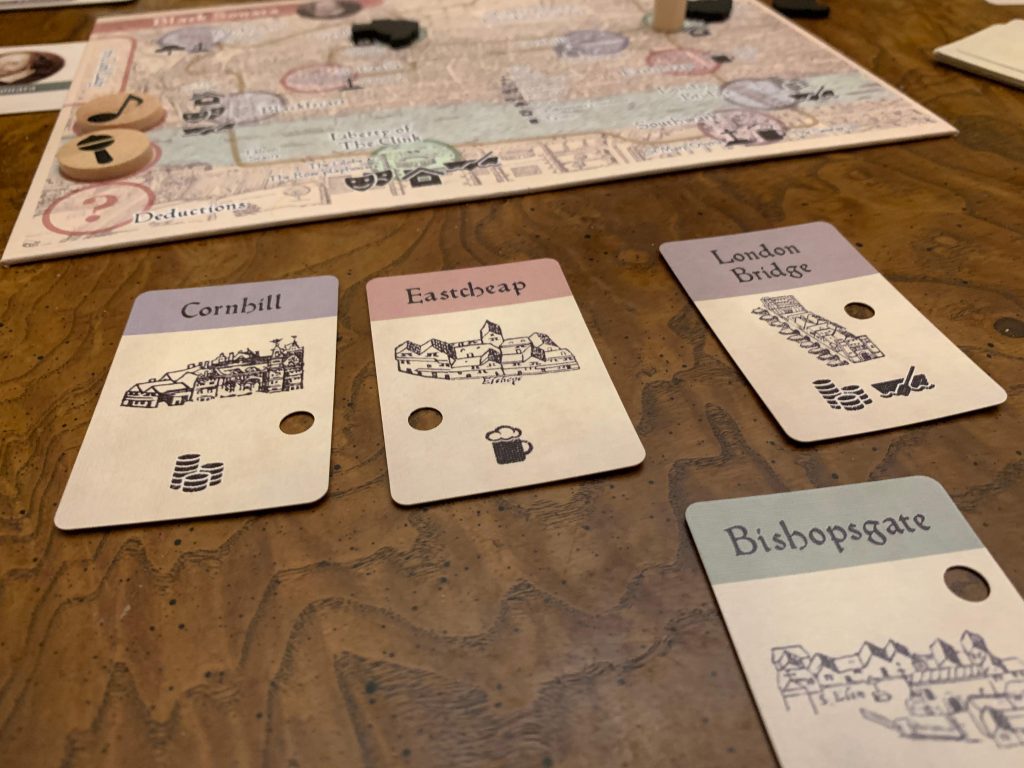
Thus, we have a solo game that is both a deduction game and a hidden movement game. If you’ve played a game like Cluedo, sit back and think about how a solitaire version would work. Don’t think too hard about it, because it doesn’t work. You can’t even play a deduction game like Cluedo or Sleuth effectively with 2 people, 3 or more being the sweet spot. Yet, Black Sonata delivers true deduction by your lonesome. Can you say, magic?
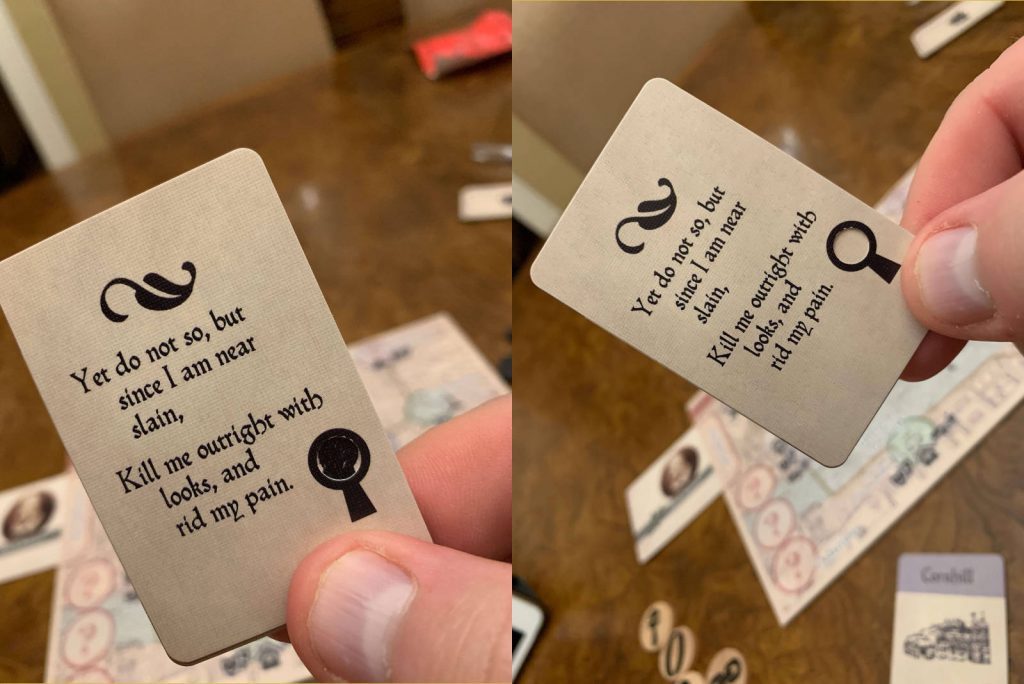
Likewise, sit back and picture a hidden movement game. Scotland Yard, Fury of Dracula, Letters from Whitechapel, Specter Ops, or whatever your hidden movement game of choice. How would any of those work solo? Again, let me just tell you. None of them would. By their very nature a hidden movement game requires at least one person to know where the hidden mover is moving and where they are at any given point. Yet, you guessed it, Black Sonata pulls it off. Magic.
I’m not going to go into details about how it all works (because, honestly, I don’t know), but it involves cards with holes in them that will allow you to see the Dark Lady’s silhouette if you happen to be at the same location in London as your quarry. It involves a deck of cards that is strictly constructed at setup that will control the lady’s movement, but will eventually get mixed up and have sections removed or obscured with fog so you lose her trail. Somehow, it still keeps her on a realistic path so you can use deduction and skill to find her.
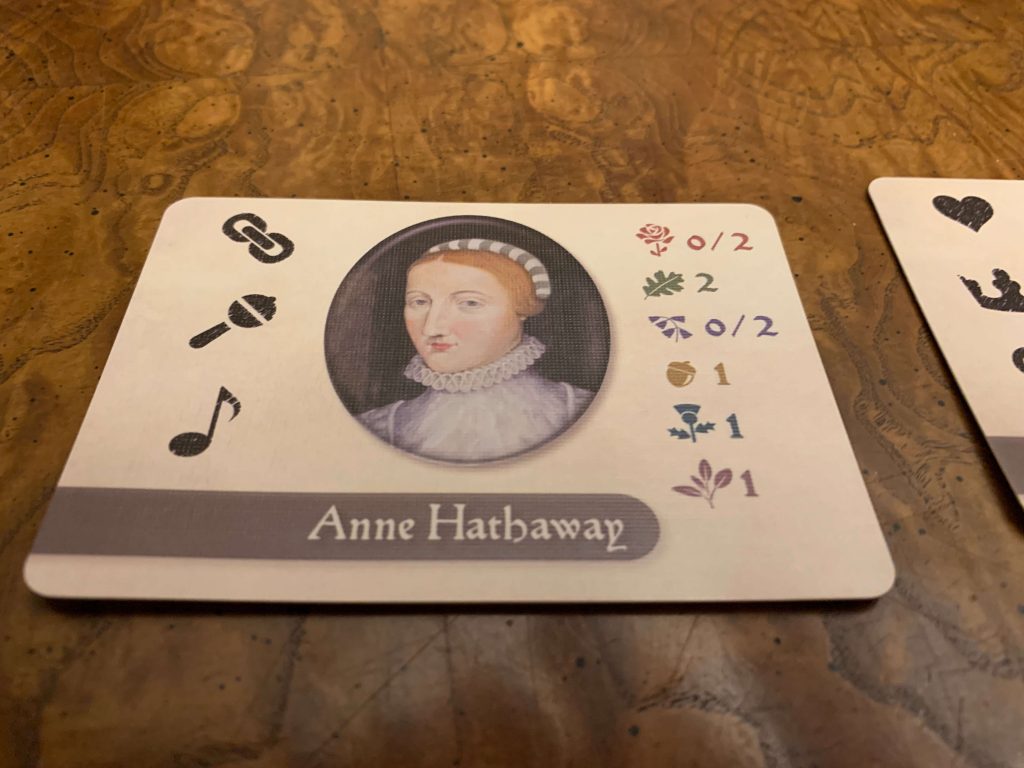
The dark lady is chosen from one of 12 cards, each with a different candidate complete with 3 traits. At game start, you’ll take one and put it face down under the board. As you successfully locate the dark lady around London, you’ll reveal one of the other cards. It will show you three traits and then tell you how many of those same traits belong to the dark lady you’ve chosen for this game. My explanation of how this works absolutely sucks [I’m glad you said it. -ed.], but putting together which traits can belong to your lady and which cannot is an epic deduction puzzle, and so much more rewarding than the typical deduction game trope of “ask a question and cross that answer off a list”. This is a true logic puzzle and it’s thick and juicy every time you play. The rulebook even offers incredibly smart ways to make the puzzle more or less juicy, and it all works like—dare I say?—magic.
I’ve never played a game like Black Sonata. It feels like a complex machine with a hundred delicate gears turning in unison, and the tiniest shake could break the entire system. It won’t, though. Turns out the game system is robust as hell, and right when you’re wondering if the game will manage to pull something off, it does.
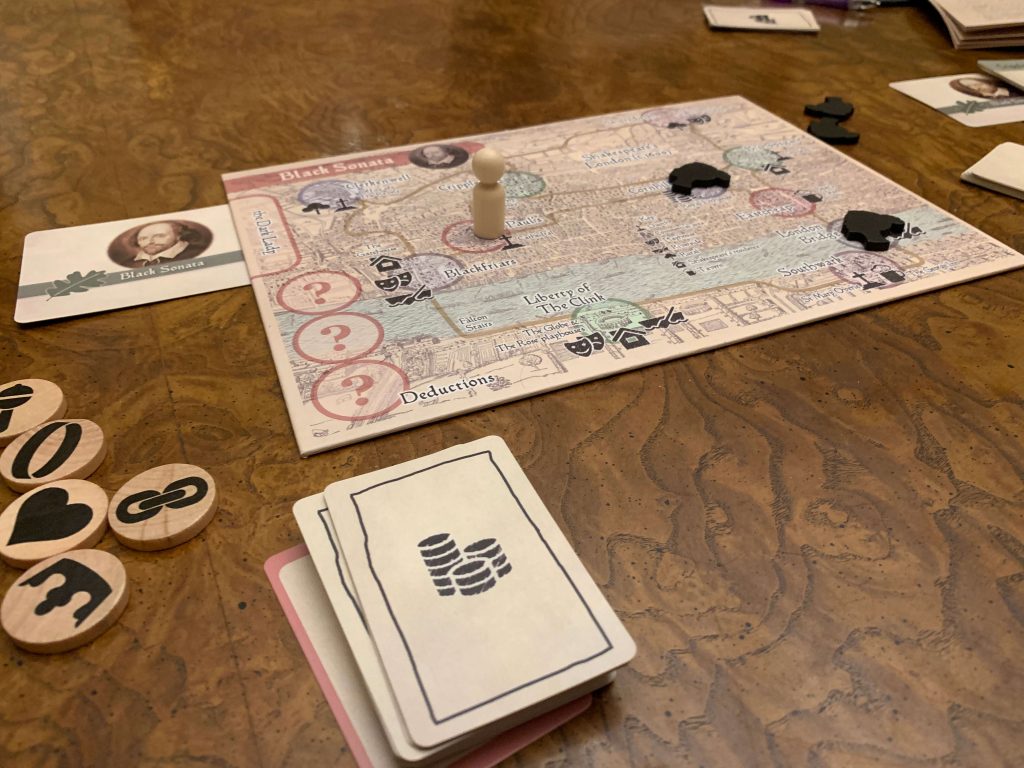
I’m making it sound deep and complex, but it’s not that bad. I was up and running in a few minutes and, while I had a few questions about the lady’s path in my first game, it all gelled incredibly quickly and games wrap up in 20-30 minutes, tops. Yet, the gameplay doesn’t feel simple. It truly feels like you’re digging into a 400 year-old mystery. It’s simplicity is hidden by a veneer of gravitas.
While I can preach about Black Sonata’s charms all day, the real display of Sonata’s greatness lies in a description of my evening. Black Sonata arrived in the mail yesterday and I immediately put it aside, expecting to not have time to learn it until the weekend. The theme eventually drew me in, however, so I thought I’d give the rules a glance. That led to a learning game, which led to another. And another. And another. Eventually, it was 1:30am and I had just finished my 8th straight game. I would have played a ninth (and, probably, 10th) if I didn’t have to get up and go to work this morning. My kids even wandered over to see what I was doing and ended up sitting and trying to work out the logic puzzle of which traits could or could not be hidden on the Dark Lady’s card.
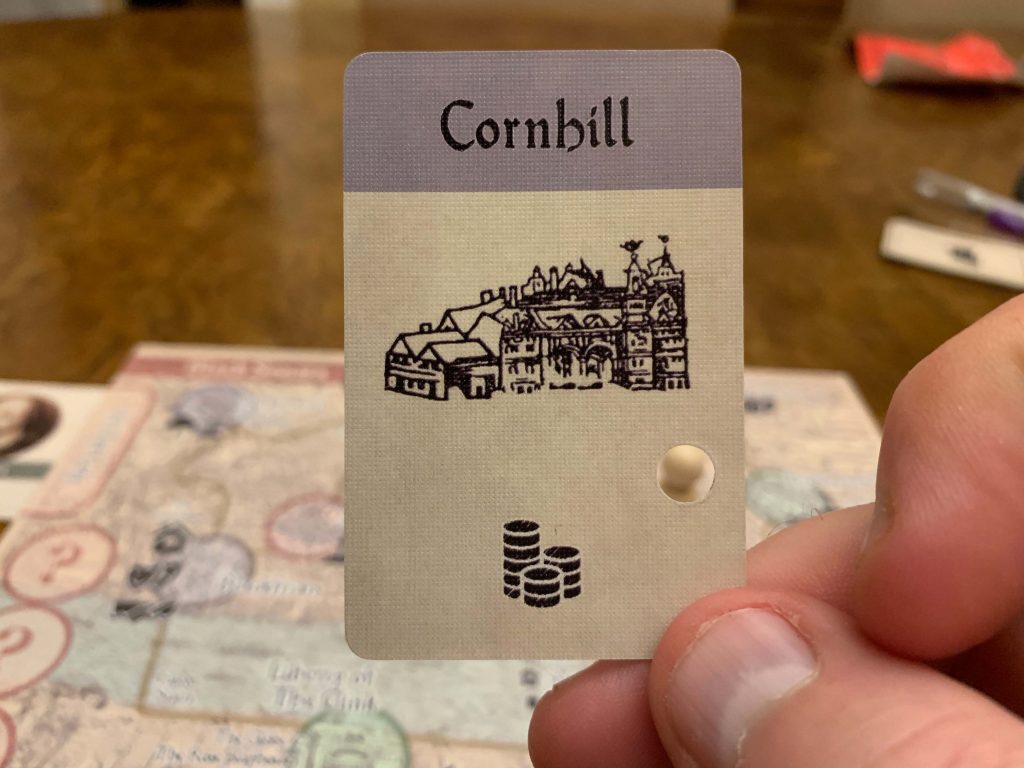
Black Sonata is a fascinating experience. The entire time I was playing, I kept waiting for the system to break, to delare that I unraveled the equation at the core of the game and, aha!, it’s just math. Just a coldly crafted math problem with an Elizabethan shroud. It’s not, though. Instead, I’m convinced that designer John Kean is a wizard; a conjurer who has sold his soul to craft something that shouldn’t be craftable. A solo game that actually feels like a multiplayer game. A solo game that will have you wishing there were a multiplayer version so you could share it with your friends. A solo game that might be the best deduction game I’ve ever played.
The only explanation that makes any sense is magic.

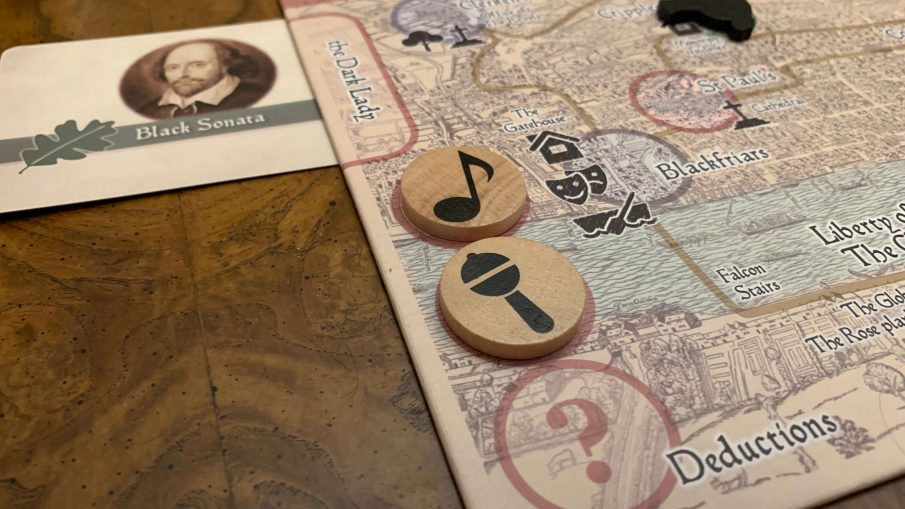

The Dark Lady was a man?
Well this is great, Dave. Not only did you not tell us about the Kickstarter, it’s a Kickstarter, so I can’t buy a copy. Fucking perfect.
[Dave does this shit all the time. He’s a complete asshole -ed.]
Also, it appears that Side Room Games has extra copies and is going to, soon, start selling them on their website. Info from BGG: https://boardgamegeek.com/article/31244890#31244890
The last time I looked at importing board games from the US, I just went back to buying cocaine, it was cheaper. God bless EU-friendly Kickstarters and those that love them (me).
My only hope is some forward-thinkers got some copies in their shops over here. So begins The Waitening.
Dave helped me get a copy ordered. I love Dave. I am better than everyone except Dave, who already has a copy.
Too bad. I hear it’s not that good.
This may be my new favorite gif.
Another option to get the game is simply to print it out and play it. Since it began, after all, as a print-n-play!
And I piggybacked on @OhBollox’ request to get an order in myself. Does this count as breaking my KS moratorium for this year?
(Not that that would be lasting much longer, with Key Market and Glen More 2 coming up…)
Whoa, whoa, whoa…what’s this now?
Glen Moreish.
More Glen
Glenmoreangie.
i geekmailed them over at the geek. got my copy coming sometime??
i was reading the article and feeling the game, went to the usual haunts trying to get a copy, no dice. then checked amazon, saw that when i was searching it it popped up i got excited. then nothing. came back and read the comments, lol
guess everyone got fooled. glad i got a copy. looks like a lot of fun.
Yeah, I didn’t think about the Kickstarter part of it. I guess I assume that Kickstarters will, eventually, make it to retail. This is a pretty small company, though, and it didn’t dawn on me that retail copies would be so scarce.
If anyone is wondering what that sound is, it’s Dave’s shades falling into place.
I grabbed a copy for my Shakespeare-loving girlfriend’s birthday. I hope she likes it!
Just received my copy in the mail and played my first game (and lost). It’s great. Completely lives up to Dave’s glowing review. As he wrote, I kept thinking, “This isn’t going to work right,” but then it all totally does. Looking forward to a lot more time with this : )
I can’t stop thinking about how mad I’m going to be if the title for the sequel to The Greatest Showman isn’t at least as clever as “The Second Greatest Showman”.
Came in the mail today and it is seriously all I can do to not tear it open and get her something else.
Dude, you really undersold just how nice this is for such a budget production. I’ve paid twice as much for games whose components were half as nice. This is so well done.
Yes, you’re right. I got caught up in the mystery of how everything actually works, but the components are top notch.
We played it together, and it was super fun. A lot of co-op games are really solo games in disguise, but I think this is the opposite!
I’ve played it coop with my kids, and it does work really well. The deduction part totally draws them in, too, which is something I didn’t expect.
Black Sonata is getting a reprint and an expansion.
I’m on the fence about getting it, but I thought I’d let everyone else know.
https://www.kickstarter.com/projects/sideroomgames/black-sonata-strange-shadows
I have a copy. Thought it would be a good option for bringing while traveling, as it’s relatively small and has a theme which wouldn’t provoke disdain from those who’d see goblins or colonialism and recoil. And … it is. There are some unintuitive elements, but it’s not that complex, and offers an interesting challenge. Ultimately, I found it unintuitive enough that I would need to relearn it to play again after a break, and, while I still mean to do that sometime, it hasn’t called me back yet. Currently, the top of the pile for solo play is Vijayanagara for long games and 20 Strong for short ones, and I have a lot more exploring to do in both of those before I want to move on.
I also had a copy (I KS’d it the first time) and liked it but not so much that I went back to it more than once (and also had to relearn it then). I eventually loaned it out and never asked for it back. I completely agree with @rinelk 's description of it.
FWiW, I also backed SideRoom’s campaigns for Orchard and Maquis, both of which I still own. Their campaigns are run very well and they fulfill when they say they will. The components are good quality too.
The top of the pile for me ATM for physical format solo games is For Northwood, which I like more the more I play it and mess with the setups.
Thanks for the comments!
I’m leaning hard into Button Shy solo games right now. Something about how small and clever they are. And when they get old there is an expansion to mess around with. The short game time really fits into what I can play right now and my attention span.
I’ve also played Orchard and Kickstartered their next game Forage. Though I’ve bounced off of Orchard. Just can’t get the feel for it.
I really love For Northwood and have started playing the campaign.
They really pack a lot into very few cards. Here are three that I’ve liked : ) Do you have any faves to recommend?
I don’t know much about those games, except Ahead in the Clouds looks fun.
I’m playing The Royal Limited. It has several VIPs to place on a train (not sure this is really a “train” game) so I’m playing all the combinations. It’s a fun puzzle.
Also loving The Last Lighthouse. It is a horror themed tower defense game.
Unsurmountable has also been fun.
Revolver Noir is a great quick 2 person hidden movement game. Been playing it with my teen and he has been killing me.
I’m planning on going to the Button Shy convention in Denver in June.
That bumps For Northwood up my want list. I’d looked into it, but hadn’t heard enough to be confident.
As for Button Shy, the biggest hit with me was R.O.V.E.—that’s been an electrifying challenge every time I’ve tried it. Skulls of Sedlec was okay, but seemed like it’d be a lot more fun competitively. I admire Sprawlopolis, but not only was I terrible at it, I couldn’t even get a handle on what I needed to pay more attention to in my next run. So I never got to the level of play where it starts to feel like you’re peeling the onion; I was just … looking at a perfectly intact onion. Unsurmountable was pleasant—a good little puzzle, but I got it at the same time as R.O.V.E., which overshadowed it for me.
R.O.V.E. and Sedlec are on order, so I’m looking forward to playing them sometime this year. ROVE has some new versions (Aqua and JR ROVE) coming out on KS.
I’m so-so with Sprawlopolis. What has helped is the Button Shy discord weekly challenges. I see how others are building their cities and it gives me ideas about how to play. A generic strategy has been to build a big park with a road running around it. I generally get a decent score just by doing that. Though I’m seeing others do radically different things and get great scores, so I’m learning.
I love Sedlec at 2P.